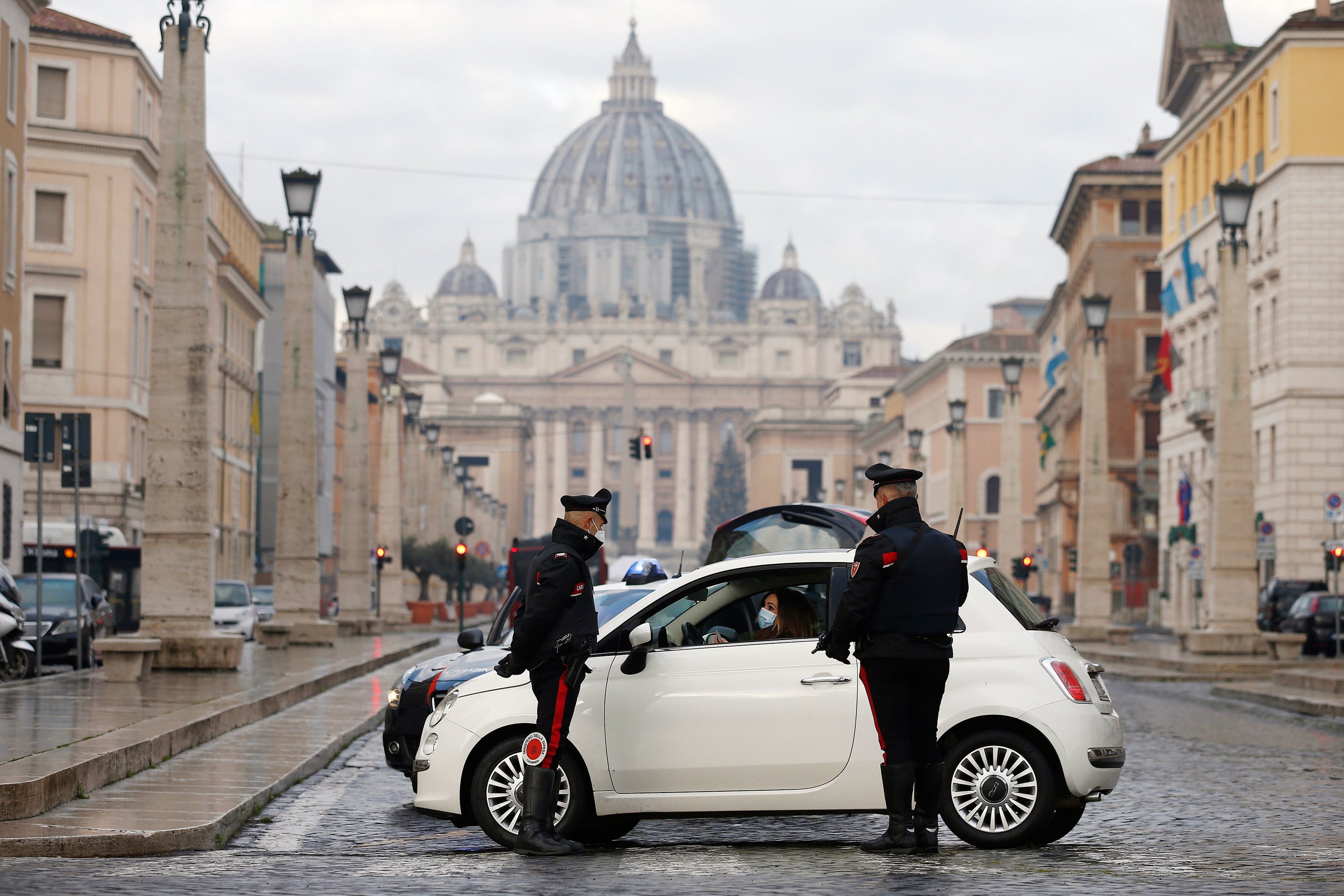Italy enters Christmas lockdown limiting holiday travel
Police in Italy are enforcing new COVID-19 travel restrictions aimed at limiting far-flung families from gathering over Christmas

Your support helps us to tell the story
From reproductive rights to climate change to Big Tech, The Independent is on the ground when the story is developing. Whether it's investigating the financials of Elon Musk's pro-Trump PAC or producing our latest documentary, 'The A Word', which shines a light on the American women fighting for reproductive rights, we know how important it is to parse out the facts from the messaging.
At such a critical moment in US history, we need reporters on the ground. Your donation allows us to keep sending journalists to speak to both sides of the story.
The Independent is trusted by Americans across the entire political spectrum. And unlike many other quality news outlets, we choose not to lock Americans out of our reporting and analysis with paywalls. We believe quality journalism should be available to everyone, paid for by those who can afford it.
Your support makes all the difference.Police in Italy enforced new COVID-19 travel restrictions aimed at limiting far-flung families from gathering over Christmas as public health officials appealed Thursday for people to use common sense to prevent new infections over the holidays.
A modified nationwide lockdown that took effect on Christmas Eve requires restrictions and closures similar to the 10 weeks of hard lockdown the Italian government imposed from March to May, when Italy became the epicenter of the coronavirus pandemic in Europe.
The country's fall wave of outbreaks has killed more people than the spring wave, according to official counts, and the aim of the new slowdown Dec. 24-Jan. 6 is to limit a January resurgence. On Wednesday, Italy's confirmed death toll in the pandemic passed 70,000, the highest in Europe. The number of confirmed cases was on track to pass 2 million on Thursday.
Italians lined up at bakeries, fish markets and grocery stores for items needed to prepare Christmas Eve dinners, even as government officials begged families to limit their “cenone” gatherings to no more than two people outside the main family unit. Christmas Eve meals are traditionally a multi-course, multi-generational affair that is a staple of Italian family life over the holidays.
“It seems banal and you can ask ‘Why only two people outside the nuclear family?’” acknowledged Dr. Giovanni Rezza, in charge of prevention at the Italian health ministry. “But it’s clearly based on probability calculations: The more you increase the size of the gathering, the more risk there is that one of these people, especially if he or she is coming from somewhere else, can be infected and therefore pose a risk to others.”
To reduce that possibility, the government barred residents starting Monday from travelling from region to region. Police were out in force on Thursday to check that Italians on the road were obeying rules limiting travel within their own regions.
Carabinieri Col. Alessandro Dominici, on patrol in front of Rome's Colosseum, said sanctions run from 400 euros to 3,000 euros, ($488-$3,700 and can increase for multiple offenses.
Residents also had to carry police-issued certificates explaining why they were outside, with work, health care and other necessities such as grocery shopping allowed.
But last-minute shopping trips proved to be crowded affairs like always on Christmas Eve. Shoppers in Rome lined up outside markets to pick up pre-ordered fish, which in much of southern Italy forms the backbone of the traditional holiday meal. Bakeries did brisk business selling “panettone” dried-fruit cakes or lighter yellow “pandoro” cakes dusted with powdered sugar that are staples for Christmastime desserts.
“Yesterday, there were 900 people in the fish department, all piled on top of one another," said Daniela Tufoni, who works in a Rome supermarket.
Tufoni said police officers pulled her over on Thursday to check that she had a legitimate reason to be out. “It's good that they do these checks, but if they go in the supermarkets, I cannot tell you what they'll find," she said from her car. “No one is respecting the distancing."
Catholic churches moved up the times of midnight Masses by a few hours so congregants could comply with a 10 p.m. curfew. Pope Francis planned to celebrate his Christmas vigil service starting at 7:30 p.m. before a small group in St. Peter's Basilica.
Non-essential shops, restaurants and bars were closed: Milan’s glass-domed Galleria mall was nearly empty, stores along Rome’s usually congested Via del Corso shopping street were shuttered and the pigeons had Venice’s St. Mark’s Square to themselves.
Restaurants and shops are expected to get a reprieve to reopen for business for a few days next week, before shuttering again before New Year's and the Jan. 6 Epiphany holiday, which marks the end of the lockdown period.
The Italian government is particularly concerned with the continued high demand for beds in both intensive care units and regular hospital wards dedicated to COVID-19 patients. Nationally, Italian hospitals remain within the government-established benchmark of having no more than 30% of ICU beds and 40% of non-ICU beds dedicated to virus patient.
Officials are aiming to keep COVID-19 hospitalizations below those thresholds so patients with other medical needs can receive treatment. Regions that go too far over the benchmarks have been put under tougher restrictions to bring down infections and related hospitalizations.
Italy is set to join the other European Union nations in administering their first doses of a COVID-19 vaccine Sunday, with health care workers and nursing home residents among the first to get shots.
___
AP visual journalist Luigi Navarro contributed.